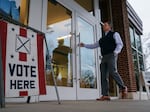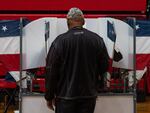
A voter entering a polling place in Mountain Brooks, Ala., on Super Tuesday on March 5, 2024. Alabama is one of several states where GOP officials are launching fresh efforts to purge their voter rolls of noncitizens, even though there's little evidence noncitizens vote in significant numbers.
Elijah Nouvelage / Getty Images
Earlier this month, Alabama voter William Pritchett received an unexpected letter from election officials telling him his voter registration was made inactive and was “on the path for removal from the statewide voter list.”
He was among more than 3,200 people on the state’s voter rolls whose registrations had been flagged by Alabama Secretary of State Wes Allen as part of a new initiative to identify possible noncitizens.
Yet Pritchett was born in Alabama and has always been an American citizen.
He told NPR he believes state election officials are “chasing a false narrative” that “noncitizens have been voting and that’s swinging elections.”
“It’s in the news every day where they want to make it into an issue,” Pritchett said. He was able to update his information with local election officials and remains registered to vote. It’s still not clear why his name was added to the state’s list.
The baseless claim that Democrats will attempt to steal the upcoming election by encouraging recently arrived migrants to vote illegally has become a key talking point for former President Donald Trump and his allies this campaign season.
That narrative sowing doubt about the validity of the U.S. electoral system is likely to be invoked by Trump and his supporters as a basis for denying election results should he lose.
Despite the fact that it has long been illegal for noncitizens to vote in federal elections and there is no credible evidence showing it happens in significant numbers, the false claim has continued to gain momentum.
But as the election nears, the false rhetoric is now having a real impact on citizens as some GOP officials are scrutinizing voter rolls and questioning some voters’ registrations in the final run-up to Election Day — which some voting advocates say violates federal law.
Baseless rumors spark an investigation
Texas Attorney General Ken Paxton launched a criminal probe into organizations that register voters after Fox Business host Maria Bartiromo spread a baseless rumor about undocumented immigrants getting registered to vote outside of Texas driver's license offices.

Texas Attorney General Ken Paxton launched an investigation into voter registration organizations after a quickly-debunked report claimed without evidence that noncitizens were registering to vote outside of driver's license offices in Texas.
Pool/Getty Images / Getty Images North America
"The Biden-Harris Administration has intentionally flooded our country with illegal aliens, and without proper safeguards, foreign nationals can illegally influence elections at the local, state, and national level," Paxton said in a statement.
Several Republican-led states have recently publicized new processes to identify and remove noncitizens from the voter rolls, though those efforts have often ensnared naturalized citizens.
“There has certainly been an uptick this election cycle in states targeting naturalized citizens,” said Kate Huddleston, an attorney with Campaign Legal Center, a nonprofit that has sent notices to Alabama, Tennessee and Texas that their state initiatives potentially violate the National Voter Registration Act.
“And it does seem connected to rhetoric related to the idea — the myth really — that noncitizens are voting in any meaningful number,” Huddleston said.
Most commonly, naturalized citizens are erroneously flagged as noncitizens due to election officials cross checking voter rolls with old data.
That happened to Roqué Marcelo, who was among more than 14,000 registered voters in Tennessee who received letters in June telling them their information “matches with an individual who may not have been a United States citizen at the time of obtaining a Tennessee driver license or ID card.”
The letter gave instructions for how to either mail in documents proving his U.S. citizenship or request to be removed from the voter list. The letter warned that voting as a noncitizen is a felony that can be punished with at least two years in jail.
Marcelo became a U.S. citizen last year.
“As I read it, the first thought in my head was, did I do something wrong? And then the next thought I had was, OK, I guess I need to verify that I can vote,” said Marcelo, who was born in the Philippines.
The letter unsettled him. "It does feel like intimidation," the 48-year-old musician told NPR.

A voter casts a ballots in Nashville on Super Tuesday, March 5, 2024. About 14,000 registered voters in Tennessee received letters from the state this year asking them to prove their citizenship or be removed from the rolls.
SETH HERALD/AFP via Getty Images / AFP
Inflated numbers of potential noncitizens
States are required by federal law to maintain their voter lists and remove ineligible people. But it must be done carefully to avoid disenfranchising eligible voters. Federal law also restricts systematic voter purges within 90 days before an election.
There are already guardrails in place to deter noncitizens from voting. It can be helpful for the public when election officials explain the systems they use to ensure ineligible people don’t vote, said Sean Morales-Doyle, an attorney at the nonprofit Brennan Center for Justice, which advocates for voting rights.
In contrast, he said, when states announce inflated numbers of possible noncitizens on the voter rolls “they can lend fuel to the fire, rather than reassure.”
In Texas, Gov. Greg Abbott announced in a news release on Monday that the state had removed "over 6,500 noncitizens" since 2021. But the release was later updated to read "over 6,500 potential noncitizens," which is a different statistic.
The change was noticed by Campaign Legal Center.
Huddleston, an attorney with the group, said past data from the Texas secretary of state’s office suggests the majority of the 6,500 potential noncitizens who were removed likely refers to people whose registrations were canceled after they did not respond to a notice inquiring about their citizenship.
"We are alarmed by the large number of voters removed on this basis, indicating that eligible Texas voters have likely been erroneously identified as potential noncitizens and purged from the rolls," reads a letter Campaign Legal Center and other organizations sent to Secretary of State Jane Nelson on Wednesday.
Nelson’s office did not return a request for comment.
Alabama generated its list of more than 3,200 possible noncitizens by cross-checking the voter rolls with a database of people who had been issued noncitizen identification numbers from the Department of Homeland Security.
In a news release announcing the effort, Alabama Secretary of State Allen acknowledged some of the people flagged could be naturalized U.S. citizens who are eligible to vote. He also said he had passed the list to the state attorney general for investigation and possible criminal prosecution.
Deterring some voters from voting
Allen told NPR in an email statement that U.S. citizens who got the letter can still vote on Election Day if they provide a valid Alabama driver’s license, nondriver identification or Social Security number. That information was not included in the letter Pritchett received.
Critics of the initiative say it unfairly burdens some U.S. citizens with an additional requirement to update their registration.
Allen denied the allegation by voting rights organizations that his initiative is in violation of federal law.
“I will not bow down to threats from ultra-liberal activist groups who will stop at nothing in their quest to see noncitizens remain on Alabama’s voter rolls,” he wrote in an email.
But letters to voters suggesting they should re-register or provide additional proof of citizenship could deter some eligible voters.
Alvaro Manrique Barrenechea became a U.S. citizen five years ago after immigrating from Peru and got the same letter from Tennessee as Roqué Marcelo did, which told him how to prove his citizenship or request to be removed from the voter rolls.
He was concerned by the letter’s instructions to mail a copy of a proof of citizenship document, such as a U.S. passport or a naturalization document.
“I did not feel comfortable submitting one of these documents via mail,” said Manrique Barrenechea, who teaches at Vanderbilt Law School as an assistant clinical professor of law.
In the end, he did not need to.
Tennessee officials sent a second letter in July clarifying that voters who did not respond to the first letter would not be removed from the voter list and could vote if they are eligible U.S. citizens.
That letter came after voting rights groups alleged Tennessee's initiative was in violation of federal law for doing voter list maintenance within 90 days of the state primary and discriminating against naturalized citizens.
The Tennessee secretary of state’s office did not return a request for comment.
Manrique Barrenechea has been working with immigrants in Nashville for almost a decade and worries the letter will suppress turnout among naturalized citizens.
“This is something that of course would make someone hesitate whether they're doing the right thing or whether they need to do an extra step to vote in this upcoming election,” Manrique Barrenechea said.
Copyright 2024 NPR